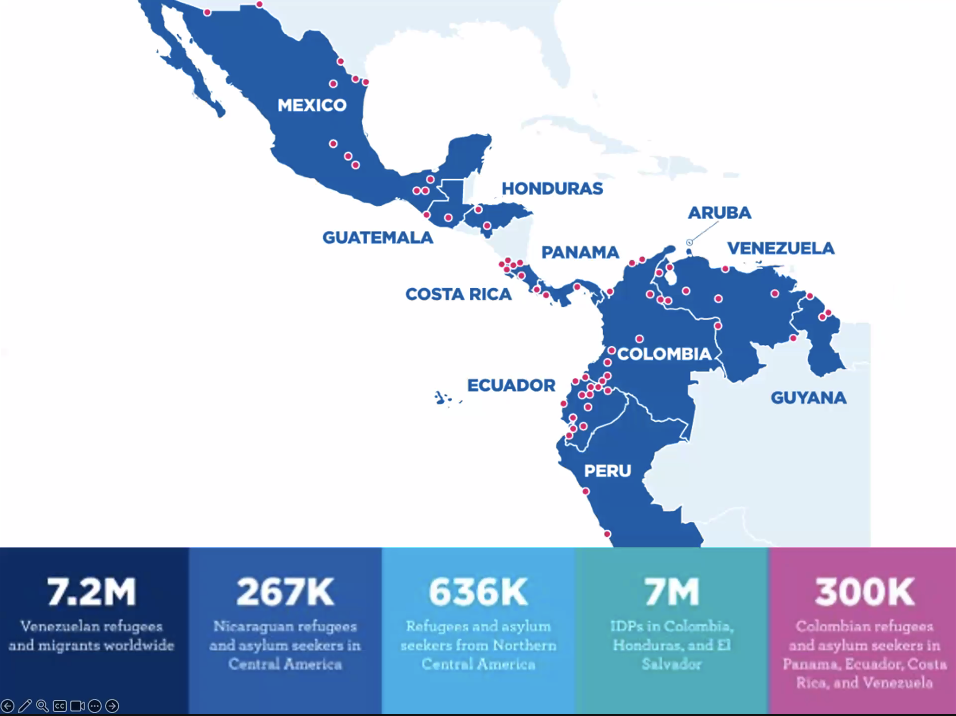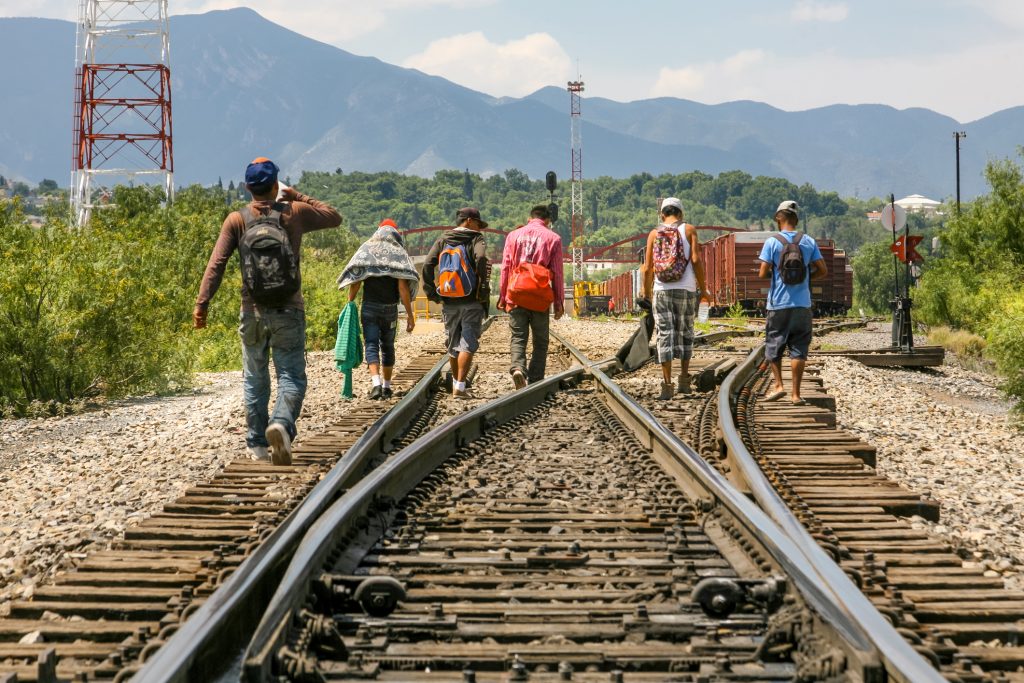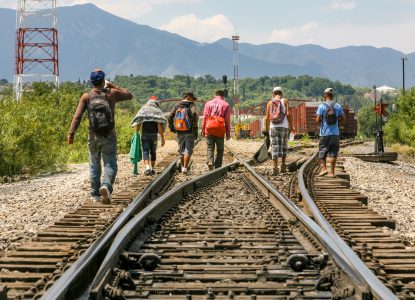By JoAnne Wadsworth, Communications Consultant, G20 Interfaith Forum
– – –
On July 18th, 2023, the G20 Interfaith Forum, in cooperation with the UN Refugee Agency (UNHCR) and the Organization of American States (OAS), held a webinar entitled “The Refugee Crisis in the Americas.”
Speakers included Juan Carlos Murillo Gonzalez, Head of the Bureau of External Engagement Service for the Americas, UNHCR; Raphael Marcus, Senior Vice President in charge of International Programs, US Programs, Emergency Response and Humanitarian Partnership, Policy and Practice at HIAS; and Bethilde Muñoz-Pogossian, Director of the Department of Social Inclusion of the Secretariat for Access to Rights and Equity at OAS. Cynthia Juarez Lange, a thought leader in global mobility programs with over 30 years’ experience in immigration law, moderated the discussion.
Cynthia Juarez Lange began the webinar by welcoming all participants and attendees, and emphasizing the importance and scope of the issue. She then invited each of the speakers to offer some comments.
Juan Carlos Murillo Gonzalez
Gonzalez centered his comments on the five main refugee and forced displacement situations currently being faced by the Latin American/Caribbean area:
- Guatemala, Honduras, and El Salvador, with 1.3 million displaced as asylum seekers, refugees, internally displaced people, and deportees needing protection
- Nicaragua, where the human rights and persecution situation has forced 350K+ people to flee since 2018, mainly to Costa Rica, to look for safety
- Haiti, where the dire humanitarian situation has brought 5M+ people in need of humanitarian assistance. 3M+ don’t have birth registration, 200K+ have been displaced due to gun violence, and there are already 800K+ Haitian nationals throughout Latin America
- Colombia, where there are 6.8M internally displaced people—the second largest number after Syria
- Venezuela, where 7.2m refugees and migrants have left the country, with 6.2M of those in Latin America and the Caribbean

He said that at the end of 2022, over 20M of the 108M displaced people worldwide were from the Americas and living in the Americas.
“It’s important to recognize that we come from a region that has always shown generosity and welcome to refugees—but we also need to take into account that this crisis is reaching unprecedented levels unheard of in contemporary history, and that these numbers are human beings whose lives are at risk.”
Bethilde Muñoz-Pogossian
Muñoz-Pogossian focused her comments on a recent study by OAS on local-level public policies in Latin America and the Caribbean, which provided a regional perspective on migrant protection and integration systems across a profoundly diverse area—and showed the perspective of individuals on the ground who are directly involved with these challenges.
She said that it’s often on the local level that innovation occurs much more rapidly, and that the region has had urgent need for such innovation. Many cities have experienced big changes with migrants seeking to access services alongside citizens. Cities that used to be places of transit are now places of settling. A lot of people are crossing borders, challenging small and low-income localities.
The study came to six main conclusions, and based on those insights, emphasized six points for better reception efforts:
- Adaptation—creating space for the participation of refugees
- Capacity building and training—focused on the practical aspects of adaptation
- Inclusion—bringing migrants into existing systems and policies
- Communication & Support—helping these populations identify and access services, etc.
- Connections—linking reception policies with integration policies, the right people, etc.
- Regularization & Identification—getting people ID, regular status, etc. since that’s the door to enjoying rights.
Raphael Marcus
Marcus gave an overview of HIAS as one of the oldest refugee agencies in the world, focusing on its efforts in the Americas. The organizaation’s core areas of focus to protect refugees and asylum seekers include:
- Prevention, mitigation, and response to gender-based violence (GBV)
- Community mental health and psychosocial services
- Legal protection
- Economic inclusion
- Resettlement
- A complementary response in certain locations on shelter, water, sanitation, hygiene, and cash voucher assistance
The organization focuses on serving children and women, and collaborates with local organizations, authorities, and community leaders to establish community centers and support networks. Their goal is to make hubs for social integration and support services for both refugees and hosts.
He said many of the main challenges faced by HIAS and other civil society organizations while struggling to coordinate with governments and make an impact include the capacity and resource constraints, the dominant role of the UN in decision-making processes, the limited willingness of states to include civil society actors in critical discussions, and reduced funding opportunities.
“Our recommendation is that we facilitate high-level engagement with the UN and governments to conduct a review of the role of civil society within the region’s main coordination mechanisms, including those at country and local levels. This assessment should aim to enhance the meaningful participation of civil society organizations in decision-making processes.”
Q&A Session
Lange then led the speakers in a Q&A Session to add further clarification on the issue and address questions from the audience. She began by defining the legal connotations of the term ‘refugee’—someone fleeing their country based on persecution in distinctly defined areas—and explained that many migrants don’t fit this strict definition exactly, which presents problems in their legal status and access to help.

What are some of the main reasons for this crisis?
Juan Carlos Murillo Gonzalez: Persecution, human rights violations, insecurity, and violence. We’re seeing people fleeing because of the acts of criminal organizations, but also due to a lack of enjoyment of socioeconomic and cultural rights (because they don’t have access to food or healthcare even though they have peace).
Bethilde Muñoz-Pogossian: We need to expand our way of understanding refugees beyond what’s in the convention. Climate change is also an issue and can cause people to be forcibly displaced, even though it’s not officially recognized. In 1984, 15 countries of this region decided to expand that view of refugees and include not only those fleeing persecution, but generalized violence, human rights violations, etc.
Cynthia Lange: Though expanding that definition of refugee doesn’t change the number of people who are leaving their countries, it does improve things for them when they arrive in a host country because they have legal status. Refugees always bring tremendous value to their host locations, but the benefits grow when they are given legal status.
Juan Carlos Murillo Gonzalez: We need to remember that individuals truly can make a difference. There are mayors in many Latin American cities who used to be refugees themselves showing solidarity, generosity, and empathy to refugees. We must highlight these positive examples of warmth and welcoming.
Raphael Marcus: Here in the US, we see way higher entrepreneurship numbers in refugees vs. people who were born here. Refugees are not a burden. Yes, hosting refugees is a responsibility, but if you deal with it right, it becomes a win-win situation. We need to change that narrative.
Conclusion
Lange then asked participants to offer closing comments and final words on solutions or how people can help.
Juan Carlos Murillo Gonzalez: We truly can make a difference if we focus on solutions. 4.5M people have been duly documented in this region. We have very generous governments granting international protection. The US still has a backlog, but received 730K asylum claims last year. Some Central and Latin American countries are the largest asylum countries in the world. There are increasing opportunities for inclusion and expanding resettlement. There’s a lot that can be done, and we need to implement a whole society approach.
Bethilde Muñoz-Pogossian:
- We need a whole society approach. Our governments have lots of obligations, and there’s political will to help but not necessarily fiscal space. So private actors and philanthropy are needed to help support with their resources.
- We must give a voice to refugees themselves. They should be designing policies and projects, doing follow up on impact. Their voices are important in this.
- It’s essential to understand migration and forced displacement as a truly hemispheric phenomenon. It isn’t limited to certain countries. It’s interconnected, it affects us all, and responses should include us all.
Raphael Marcus: What’s really important is recognizing and acknowledging the work of civic society, and changing some of the incorrect perceptions around FBOs.
Lange then thanked participants and attendees and closed the meeting. Watch the full recording of the webinar below.
– – –
JoAnne Wadsworth is a Communications Consultant for the G20 Interfaith Association and acting editor of the “Viewpoints” blog.


